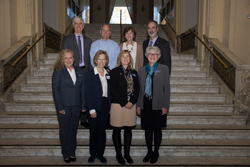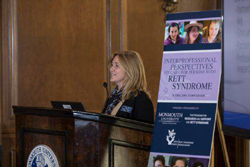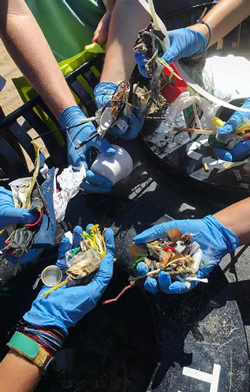The School of Education announced the Program for Research and Support for Rett Syndrome (RTT), in collaboration with the New Jersey Rett Syndrome Association (NJRSA) at a conference held in the Wilson Hall Versailles room on Friday, Nov. 17.
The purpose of the event was to provide information from inter-professional perspectives on care in RTT, and to educate attendees on the condition, the program and its functionality.
RTT is a rare non-inherited genetic postnatal neurological disorder that occurs almost exclusively in girls and can lead to severe deficiencies in communication, motor skills, eating, and breathing.
The conference began with registration and a light breakfast, with welcome remarks from John Henning, Ph.D., Dean of the School of Education, to open up the event to their guest speakers.
Patricia Remshifski, PhD, CCC-SLP, the Chair of the Department of Speech-Language Pathology and Coordinator of the Program for Research and Support for Rett Syndrome, presented on the program.
Remshifski first explained the primary goal, which is to establish a University-based program for research and support for individuals with RTT and their families. She then highlighted the approximately 200 families in New Jersey who are affected in some way by the disease, and stressed that they are in need of support, education, and treatment.
These families were the inspiration for the establishment of the program, and the University is able to provide service, academic experience and a personalized education for students working with these families outside of the classroom.
“We hope to support Rett Syndrome in the community, and provide treatment for communication while bringing families together,” Remshifski said.
 The initial outcomes of the program will include treatment via speech-language services by the Center for Speech and Language Disorders, the establishment of support groups and service learning projects, and education in the form of an annual conference, which would include the attendance of professionals from the field of SLP, PT, nursing, as well as physicians.
The initial outcomes of the program will include treatment via speech-language services by the Center for Speech and Language Disorders, the establishment of support groups and service learning projects, and education in the form of an annual conference, which would include the attendance of professionals from the field of SLP, PT, nursing, as well as physicians.
Perspectives from these various fields were provided at the conference, with presentations from, Steven Kaminsky, PhD, the Chief Science Officer of the International Rett Syndrome Foundation, who believes the program will be “tremendously impactful.”
“It is the best thing for the community to have multidisciplinary therapy, clinics, physical therapy and speech pathology all at one location to address all of the issues of development. That can really make a difference,” Kaminsky said.
Joan Raso, MSN, RN, a nursing specialist professor and coordinator of the Nursing Simulation Lab at the University also spoke at the event. Raso’s daughter has lived with RTT, and Raso was able to inform attendees on the reality of living with RTT, and why families often need more help.
“Being the parent of a daughter with Rett Syndrome has brought me full circle,” Raso said. “Rett is a four letter word, and that word is love,” Raso said in her presentation, explaining that while being the caretaker of someone living with Retts can be difficult, it is not any less rewarding.
“I truly know why I am a registered nurse; and I honestly do not know how parents without a medical background manage the day to day care of their daughters. Carly inspires me every day with her radiant smile, unyielding patience and unconditional love,” Raso continued.
Carleen Higgins, a graduate student of speech-language pathology, has been working with a young woman living with Retts syndrome through a clinical externship.
“I am extremely lucky to be working with this client and her family,” Higgins said. “A lot of people might think that women living with Retts are unable to communicate, but that is not true. Just like any 19 to 22 year old, my client is motivated to learn and communicate by what interests her, and with patience and the right treatment it is possible. It is important now more than ever to have these services available to the community, as these girls are aging out of the school system.”
Theresa Bartolotta, Ph.D., CCC-SLP, a professor of speech-language pathology, also presented on international clinical guidelines for the management of communication in individuals with RTT.
In addition to her over 30 years of experience, Bartolotta has a daughter affected by RTT. “Before she was diagnosed, I had never heard of it before. My personal life and my professional life goals all started aligning and I was able to do that because of the love I have for my daughter and what I do.”
PHOTOS COURTESY of Anthony DePrimo




